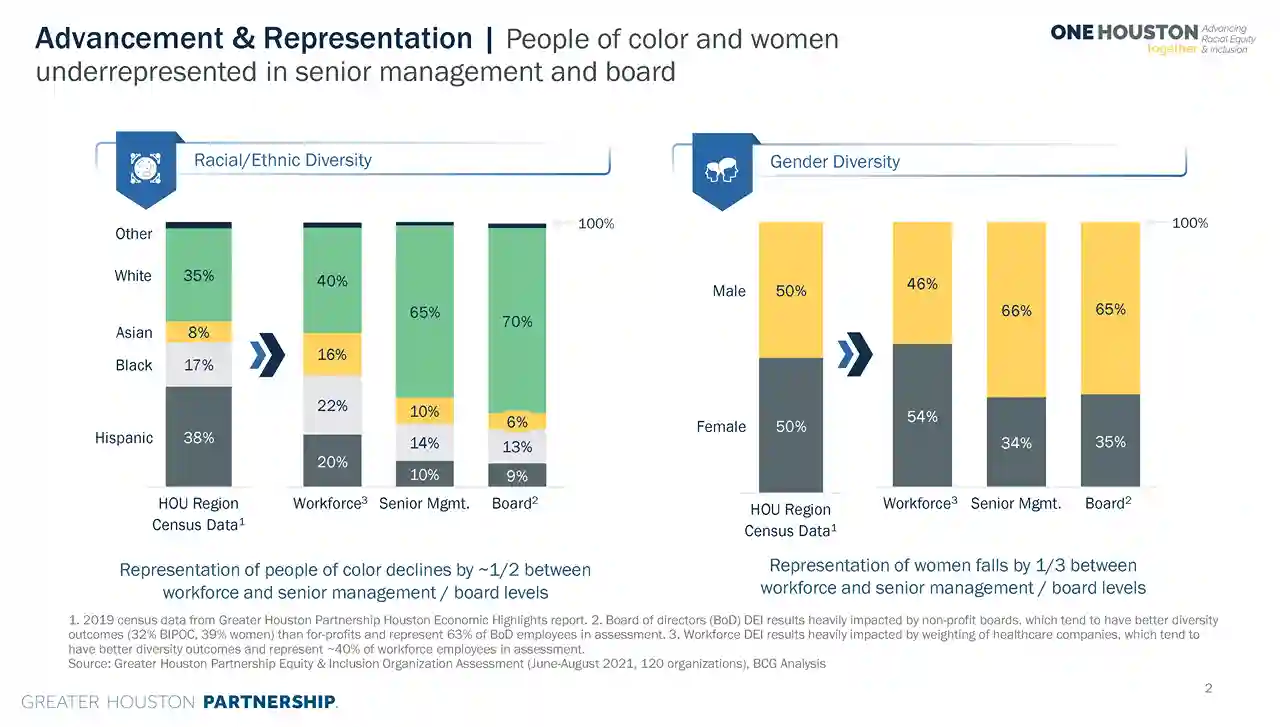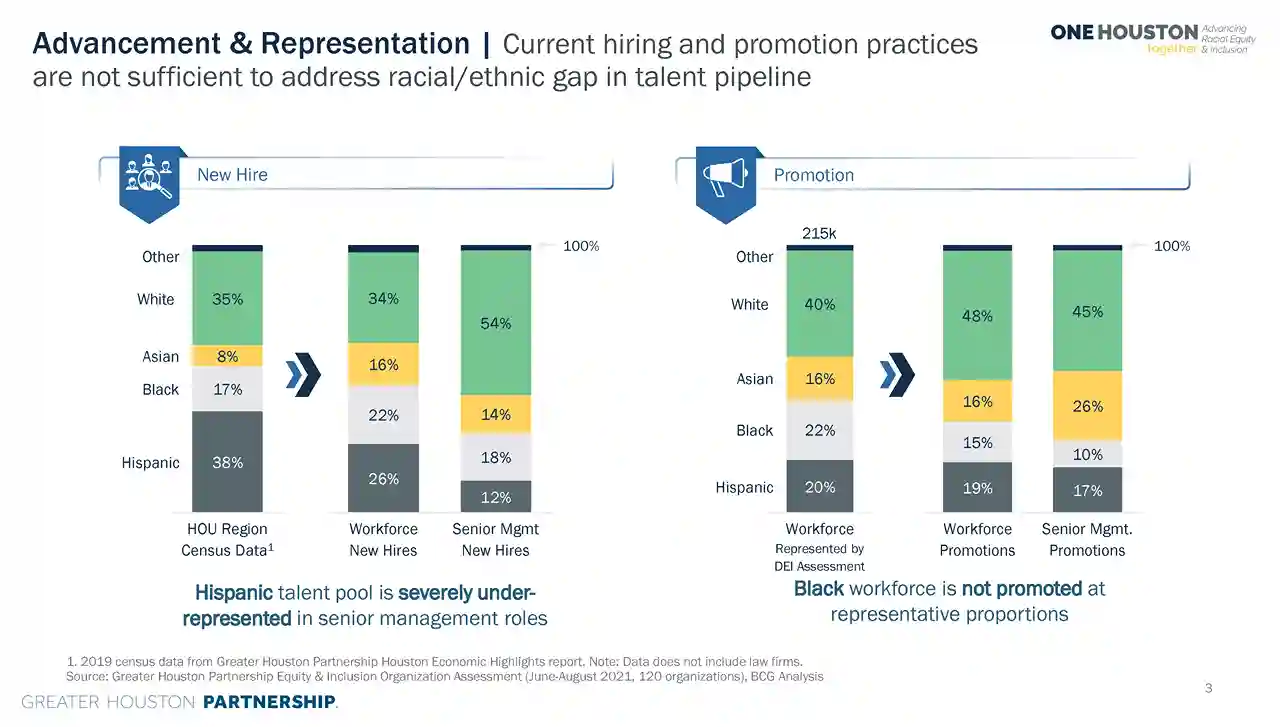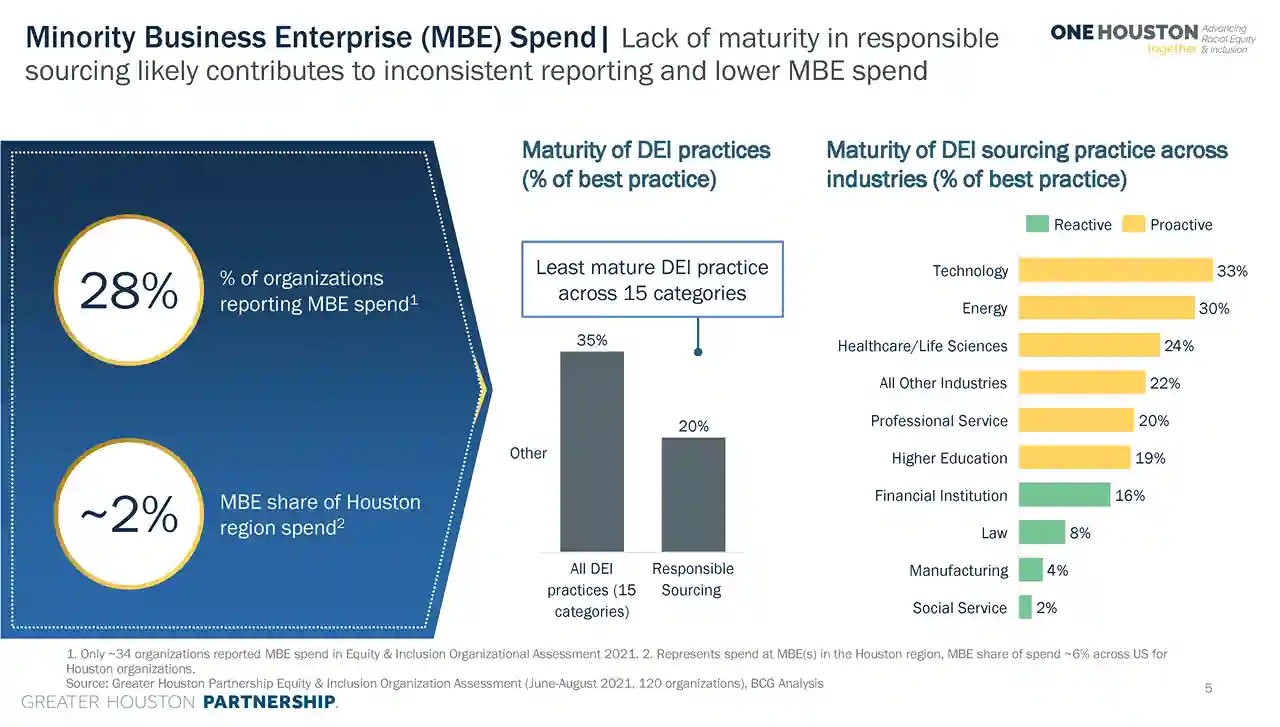HOUSTON (October 26, 2021) – Houston area companies are largely proactive when it comes to advancing equity and inclusion in their business practices, but many are falling short of adequately addressing the racial, ethnic and gender gaps in the talent pipeline and promoting people of color and women to senior leadership roles and board positions, according to findings from the Houston region’s first Equity & Inclusion Organization Assessment. A total of 120 companies and organizations representing 215,000 employees in the region participated in the assessment conducted by the Greater Houston Partnership, which will use the results to guide its efforts to advance equity and inclusion in the business community.
The Partnership invited businesses and organizations across the 12-county region to participate in the assessment as a key component of One Houston Together, the organization’s commitment to leverage the power of the business community to reduce inequities in the metro area. The 120 organizations that responded are a representative sample of the region’s private sector companies as well as nonprofits and public entities. While the results reveal areas for focus, they also highlight the range of maturity in the region.
The assessment, based on a tool designed by the Greater Cleveland Partnership, helped responding organizations measure their progress on workforce and leadership, race and gender diversity, supplier diversity, and 15 DEI Best Practice categories. The assessment’s regional baseline is the first of its kind among major U.S. metros and establishes a starting point for advancing equity and inclusion in the Houston area. Key findings of the assessment include:
- 35% of Houston organizations are rated as “proactive” across the 15 categories. Technology and financial institutions lead other industry clusters.
- People of color and women are underrepresented in senior leadership roles. Racial and ethnic diversity decreases by about half, whereas gender diversity decreases by roughly one-third between workforce and leadership levels. Female representation deteriorates at higher levels across all races.
- Hispanic talent is underrepresented at all levels.
- Houston companies report higher maturity in foundational and internally focused DEI practices, such as recruitment and retention, but lag when it comes to externally focused DEI practices, such as responsible sourcing.
- Less than one-third of participants reported on their Minority Business Enterprise (MBE) spending and those that did averaged just 2% of their total market spend on MBEs. On average, responsible sourcing practices were the least mature of the 15 categories among respondents. Note: Minority Business Enterprise are defined as those with 51% operations owned and controlled by one or more person(s) belonging to the following groups: Black or African American, Hispanic or Latino, American Indian/Indigenous or Asian.
- Public/Non-profit organizations outperform private sector organizations in addressing racial and gender gaps in new hires and promotions.
- Houston organizations average at the “proactive” level — 35% maturity level compared to 100% for best practices
- Technology, financial institutions, energy, healthcare/life sciences, and professional services are the most mature industries.
The Partnership established a Racial Equity Committee of its board in 2020, which has since adopted guiding principles for racial equity and identified two areas of action for One Houston Together: accelerating the growth of underrepresented businesses and increasing racial equity in the corporate talent pipeline and executive leadership. The committee deployed the assessment to better understand where area businesses are in their equity and inclusion journey and establish a baseline for future advancement. Boston Consulting Group assisted the Partnership in analyzing the results of the assessment, which were released at the DiverseCity Summit on October 26.
Addressing inequity and ensuring opportunity for all are critical to the long-term economic success of the Houston metro. In the most diverse city in the nation, minority business owners and individuals in the Houston workforce must be afforded the same opportunities for advancement as their peers to sustain the prosperity of the region. Houston organizations recognize the imperative to lead in this work.
“Advancing opportunity for all is one of the primary pillars of the Partnership’s Houston Next strategic plan aimed at advancing further as a great global city,” said Bob Harvey, President and CEO of the Partnership. “That’s why it was important for us to take this step as the first major metro to establish a regional baseline for where our business community stands on equity and inclusion. We are admittedly not where we want to be, and these results tell us that we have much work to do. However, now we have the knowledge needed to take decisive action. This assessment provides the starting point from which we can move forward.”
“Today’s business and organization leaders know they need to be doing more when it comes to equity and inclusion, however they’ve lacked a roadmap,” said Ruth Simmons, President of Prairie View A&M University and Co-chair of the Partnership’s Racial Equity Committee. “This assessment tells us that our current hiring and promotion practices are insufficient in addressing the gap in talent diversity, but it also provides us with the tools needed to carry this forward in a constructive way. I believe Houston is poised to make significant progress, but we can’t let the perfect be the enemy of the good.”
Through One Houston Together, the Partnership will take specific actions to begin tackling the equity challenges in talent and procurement.
- Provide an interactive online dashboard for deeper learning and to help CEOs, human resource professionals, diversity and procurement leaders benchmark their organization’s performance within their industry and against other industries
- Facilitate industry work groups to align on regional indicators of progress and share best practices for talent advancement, board representation, and supplier diversity
- Develop industry fact sheets to help companies identify shared ambitions and starting points for action
- Support organizations to identify strategies as well as set bold goals and track progress on advancement, representation, and supplier diversity.
“Businesses and organizations now have the responsibility to act on the information gathered in the assessment,” said Amy Chronis, Deloitte LLP’s Houston Managing Partner and Partnership Board Chair. “Many organizations are moving in the right direction, and have alignment on what’s needed to create change,” Chronis said. “Real, meaningful change doesn’t happen without collective action and the commitment needed from the business community.”
See the full assessment results on an interactive dashboard.
See the slides below for some of the findings. You can click on each image to enlarge.



Greater Houston Partnership
The Greater Houston Partnership works to make Houston one of the best places to live, work and build a business. As the economic development organization for the Houston region, the Partnership advances growth across 12 counties by bringing together business and civic-minded leaders who are dedicated to the area’s long-term success. Representing 900 member organizations and approximately one-fifth of the region’s workforce, the Partnership is the place business leaders come together to make an impact. Learn more at Houston.org.
CONTACT:
A.J. Mistretta
Vice President, Communications
[email protected]
(c) 504-450-3516